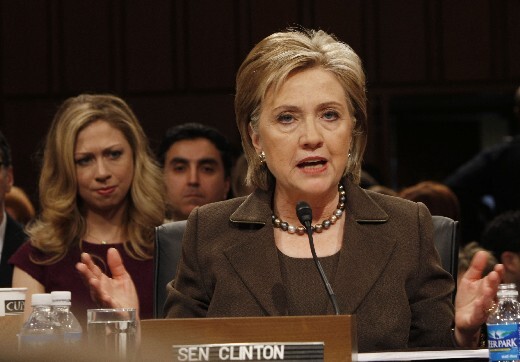hankyoreh
Links to other country sites 다른 나라 사이트 링크
U.S. to apply ‘smart power’ tactics to North Korea policy

In a United States Senate Foreign Relations Committee confirmation hearing that took place over a period of more than five hours Tuesday (EST), Senator Hillary Rodham Clinton, the nominee-designate for U.S. Secretary of State, devoted a very brief amount of time to discussing North Korea policy, including North Korean nuclear weapons. However, her brief and general words on the subject clearly showed the tenor and direction of the North Korea policy to be pursued by the administration of President-elect Barack Obama.
In a noteworthy section, she indicated that “smart power,” emphasized as a key to the Obama administration’s foreign policy, is to be applied to North Korea as well, and she emphasized that urgent measures would be taken to prevent nuclear proliferation in North Korea. The gist of her message was that a focused response will be made to resolve the North Korean nuclear issue and that “tough-minded, intelligent diplomacy” will play a “leading role” in the process.
Clinton defined smart power as “the full range of tools at our disposal -- diplomatic, economic, military, political, legal, and cultural.”
In connection with the North Korean nuclear issue, Clinton emphasized a need to “act with urgency.” This runs contrary to predictions that the Obama administration will set aside the North Korea issue as a “low priority” because they are tied up with overcoming the economic crisis and issues in Iraq, Afghanistan and the Middle East. This is being interpreted as following in line with the recognition that North Korea’s denuclearization and return to the Nuclear Non-Proliferation Treaty are urgent tasks that can be accomplished through diplomacy and that must be completed in order to maintain and strengthen the NPT, which has been stressed as a central task of the Obama administration’s foreign policy.
Clinton also stated that she and President-elect Obama felt that the six-party talks had advantages in bringing the North Korean nuclear issue to an end and said that the talks also presented an opportunity for the United States and North Korea to come into contact. These statements indicated that bilateral dialogue between the two countries will be conducted in tandem with the six-party talks. This concept does not differ greatly from the structure of a comprehensive parallel resolution of the denuclearization of the Korean Peninsula and the normalization of North Korea-U.S. relations, which has been advocated by Obama’s advisers and progressive U.S. think tanks.
“Based on Clinton’s statement at the confirmation hearing, there is a possibility of a clash with the Lee Myung-bak administration’s North Korea policy keynote of ‘responding to the North Korean nuclear issue through South Korea-U.S. cooperation,’ rather than direct dialogue between North Korea and the U.S.,” said Kim Yeon-cheol, head of the Hankyoreh Peace Research Institute.
Clinton also called the U.S.-Japan alliance the “cornerstone of American policy in Asia” and said that the South Korea-U.S. relationship was a “crucial economic and security partnership.” She called China a “critically important actor in a changing global landscape” and said, “We want a positive and cooperative relationship with China.”
Please direct questions or comments to [englishhani@hani.co.kr]
Editorial・opinion
![[Editorial] Penalties for airing allegations against Korea’s first lady endanger free press [Editorial] Penalties for airing allegations against Korea’s first lady endanger free press](https://flexible.img.hani.co.kr/flexible/normal/500/300/imgdb/original/2024/0502/1817146398095106.jpg) [Editorial] Penalties for airing allegations against Korea’s first lady endanger free press
[Editorial] Penalties for airing allegations against Korea’s first lady endanger free press![[Editorial] Yoon must halt procurement of SM-3 interceptor missiles [Editorial] Yoon must halt procurement of SM-3 interceptor missiles](https://flexible.img.hani.co.kr/flexible/normal/500/300/imgdb/child/2024/0501/17145495551605_1717145495195344.jpg) [Editorial] Yoon must halt procurement of SM-3 interceptor missiles
[Editorial] Yoon must halt procurement of SM-3 interceptor missiles- [Guest essay] Maybe Korea’s rapid population decline is an opportunity, not a crisis
- [Column] Can Yoon steer diplomacy with Russia, China back on track?
- [Column] Season 2 of special prosecutor probe may be coming to Korea soon
- [Column] Park Geun-hye déjà vu in Yoon Suk-yeol
- [Editorial] New weight of N. Korea’s nuclear threats makes dialogue all the more urgent
- [Guest essay] The real reason Korea’s new right wants to dub Rhee a founding father
- [Column] ‘Choson’: Is it time we start referring to N. Korea in its own terms?
- [Editorial] Japan’s rewriting of history with Korea has gone too far
Most viewed articles
- 1Months and months of overdue wages are pushing migrant workers in Korea into debt
- 2Trump asks why US would defend Korea, hints at hiking Seoul’s defense cost burden
- 31 in 3 S. Korean security experts support nuclear armament, CSIS finds
- 4[Editorial] Yoon must halt procurement of SM-3 interceptor missiles
- 5[Guest essay] Maybe Korea’s rapid population decline is an opportunity, not a crisis
- 6Fruitless Yoon-Lee summit inflames partisan tensions in Korea
- 7[Column] Can Yoon steer diplomacy with Russia, China back on track?
- 8At heart of West’s handwringing over Chinese ‘overcapacity,’ a battle to lead key future industries
- 9South Korea officially an aged society just 17 years after becoming aging society
- 10Under conservative chief, Korea’s TRC brands teenage wartime massacre victims as traitors